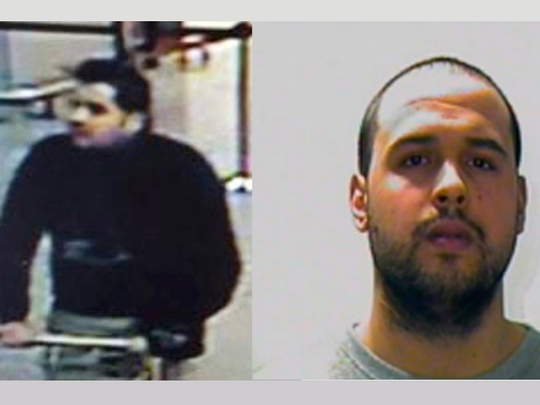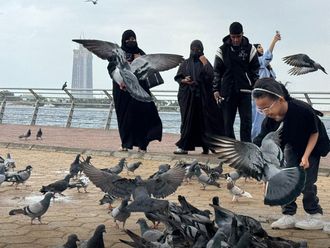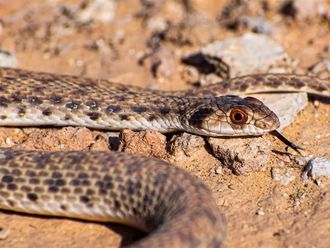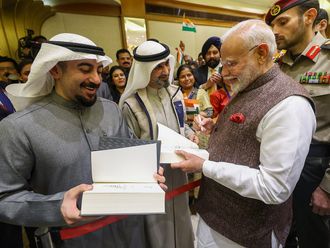
Brussels: Authorities on Wednesday named two suicide bombers who struck Brussels as brothers linked to the prime suspect in the Paris attacks, as a manhunt for a third assailant in Belgium’s bloodiest terror assault gathered pace.
Belgium’s federal prosecutor named Ebrahim Al Bakraoui as one of two men who blew themselves up at Brussels airport on Tuesday, while his brother, Khalid, struck a crowded metro train in coordinated blasts that left 31 dead and 270 injured.
“The third man is on the run,” prosecutor Frederic Van Leeuw said of a man seen on CCTV pushing a trolley through Zaventem Airport alongside the two suicide bombers, shortly before the attacks claimed by terrorist outfit Daesh.
“He left his bag with the biggest bomb in it, which exploded later because it was so unstable,” Van Leeuw told a press conference, adding that police had found a massive stash of explosives in a Brussels apartment.
Belgian investigators have unleashed a dragnet, releasing CCTV images of the three airport attackers — with the second suicide bomber and the third man, on the run, still unidentified.
Belgium stood still at noon to mark a minute’s silence for the victims of the carnage that left bodies strewn across the airport’s departures hall and a train at Maalbeek station, near the European Union’s headquarters.
Police had already been hunting the Bakraoui brothers, both Belgian nationals, over their links to Salah Abdeslam, the key suspect in the Paris attacks, which left 130 people dead, who was arrested in Brussels on Friday after four months on the run.
The attackers’ link to Abdeslam — who told investigators he was planning an attack on Brussels — has underscored fears about Europe’s struggle to combat home-grown terrorism.
Van Leeuw revealed that airport bomber Ebrahim Al Bakraoui had left a desperate “will” on a computer that he dumped in a trash can on the street, in which he said he was being “hunted everywhere”.
“I don’t know what to do,” the letter read. And in an apparent reference to the Paris attacker Abdeslam, he added: “I don’t want to end up in a cell next to him.”
Investigators had found an unexploded bomb, a Daesh flag and bomb-making materials in an apartment on the same street in the Brussels district of Schaerbeek on Tuesday night.
The find also included 15 kilos of TATP high explosive, Van Leeuw confirmed.
Authorities are under heavy pressure over their apparent inability to undermine extremist networks in Belgium, Europe’s top exporter of such fighters to Syria per capita.
Broadcaster RTBF said metro bomber Khalid Al Bakraoui had rented an apartment in Brussels last week under a false name where Abdeslam’s fingerprints were found.
He is also linked to another apartment in southern Belgium that Abdeslam and other extremists used before the Paris attacks.
Three days of national mourning have been declared in a country deeply shocked by the carnage.
King Philippe and Prime Minister Charles Michel led a minute’s silence outside the European Union (EU) headquarters in Brussels, the symbolic capital of Europe that is also home to North Atlantic Treaty Organisation (Nato).
And at the city’s Place de la Bourse, defiant applause broke out amongst the large crowd gathered to honour the dead, chanting: “Long live Belgium”.
The airport announced it would stay shut through Thursday after the bombings that wrecked its main terminal building.
And while the city’s subway system partially reopened after a day of lockdown, Belgium’s friendly international football match against Portugal, due to take place in Brussels next Tuesday, was moved to Portugal.
Leaders across Europe have reacted with outrage to the attacks, with the EU vowing to defend democracy and tolerance but also combat terrorism “with all means necessary.”
Landmarks from the Eiffel Tower in Paris to Berlin’s Brandenburg Gate lit up in the black, yellow and red of Belgium’s national flag in solidarity on Tuesday night, while on social media, thousands shared images of beloved Belgian cartoon character Tintin in tears.
Analysts said the attacks pointed to a sophisticated radical network in Europe, and French Prime Minister Manuel Valls said there was an “urgent need” to tighten the EU’s external borders following the attacks.
Cities across the continent have scrambled to boost security at airports and other potential targets, while Belgium remains on maximum alert.
Australia’s Prime Minister, Malcolm Turnbull, said Europe had “allowed security to slip”, questioning the wisdom of EU’s Schengen passport-free zone, while the US warned citizens about the “potential risks” of travelling in Europe.
“I’m a bit afraid, especially for my little brothers,” said 18-year-old Dominique Salazar as she took her young siblings to school.
“But we don’t have any other choice to get around.”
Soldiers were checking passengers’ bags and the rush-hour crowds were thinner than usual.
Belgian Foreign Minister Didier Reynders said around 40 nationalities were among the dead and wounded, including citizens of Britain, Colombia, France, Peru and the US.
The wounded included 19-year-old Mason Wells, an American missionary who had survived the 2013 Boston marathon bombing. He was reportedly also been in Paris when the terror attacks struck in November.
Daesh claimed the bombings, saying “soldiers of the caliphate” had carried out the attacks against “the crusader state” of Belgium — part of the international coalition that has been carrying out strikes against the group in Iraq.
The government had been considering extending the strikes against Daesh targets in Syria, where the extremists still hold swathes of territory.











